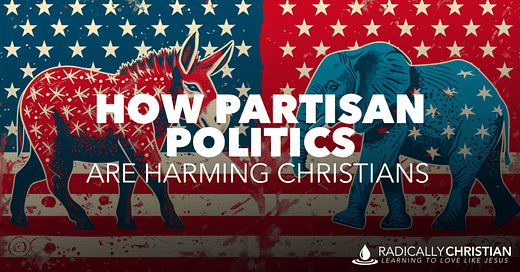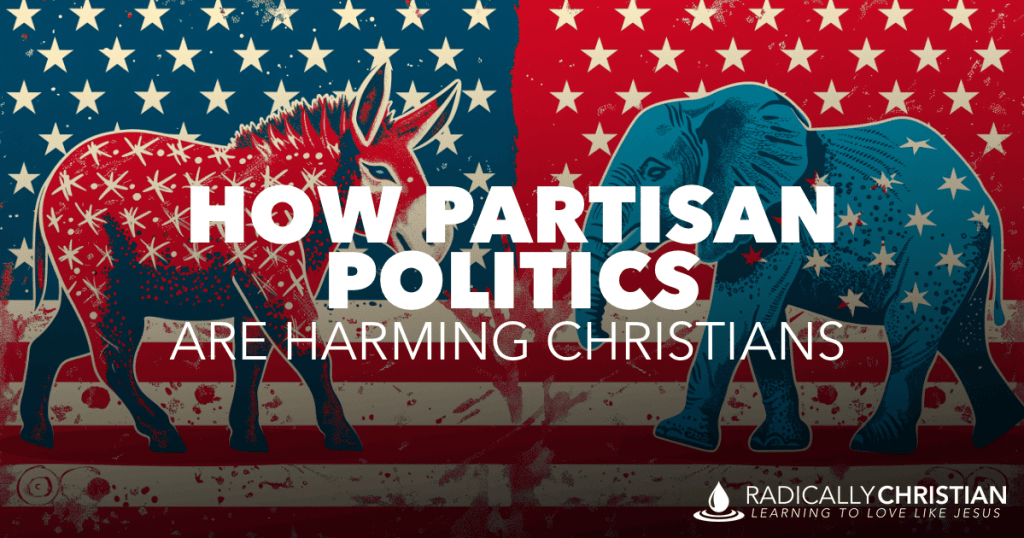How Partisan Politics are Harming Christians
I believe Christians can vote, engage in political conversations, and be passionate about policies and issues. I don’t believe we should sit idly by while our neighbors suffer if we can contribute something helpful to the collective conversation. However, when we engage in political conversations, we should avoid becoming partisan. What does it mean to be partisan and what are some of the negative consequences of partisan politics?
What Does It Mean to Be Partisan?
The dictionary defines partisan as, “feeling, showing, or deriving from strong and sometimes blind adherence to a particular party, faction, cause, or person.” Pay special attention to the words, “strong and sometimes blind adherence.” It might be helpful to think about partisanship in terms of loyalty, commitment, or devotion.
Partisan loyalty is often so strong that political affiliation becomes core to a person’s identity. For instance, when we fall into the partisan trap, we do not simply agree with Democrats or Republicans on certain issues, “Democrat” or “Republican” becomes fundamental to how we think of ourselves. Similarly, ideological perspectives, such as “Progressive” or “Conservative,” can also become cornerstones of our identity.
I heard a story recently about a man who was asked if he would prefer his kids to grow up to be Christians or members of a particular political party. In all sincerity, he replied, “What’s the difference?” He honestly could not see the difference between the church and his political party. His partisanship had become his identity.
Finally, partisans sometimes become fixated on a political leader. Our loyalty gets directed to the person who leads the party, embodies the party’s values, or seems capable of saving the party from opponents. The “strong and sometimes blind adherence” is concentrated on one particular person.
So, what happens when we give our loyalty to a politician, a party, or an ideological group? What are some of the negative effects of partisanship?
Values Shaped by Culture, Not by Christ
For Christians, partisanship often begins with genuine Christian motivation. We find that one party seems to align with biblical values on a particular issue or policy. Perhaps it is a concern for the poor or a concern for the unborn. It could be a biblical stance on sexual ethics or justice for people wrongly accused of crime. This desire to support a party that supports biblical values is admirable.
However, political parties are a mixed bag. No political party aligns completely with kingdom interests, values, and priorities. When we develop a “strong and sometimes blind adherence” to a political party, that party begins to shape our values.
Sadly, many of us are towing the party line rather than holding fast to the truth of Scripture. We have abandoned the historic Christian view on war, abortion, wealth, poverty, ethnicity, sexuality, gender, or something else…and we don’t even know it. We have allowed a party platform, rather than the Holy Spirit, to shape our views.
Because we agree with a party on issue X, we blindly assume that party must also be right on issue Y. This is a dangerous and harmful assumption.
Anger, Outrage, and Division
The partisan spirit is a spirit of division. When we have a “strong and sometimes blind adherence” to a particular side, we tend to assume everyone on the other side is foolish, evil, or both. We do not see political opponents as people to listen to, understand, empathize with, and love. We see them as enemies to silence and defeat. As Christians, we go so far as to doubt someone can truly be a Christian if they vote for the other party.
Partisanship often becomes so severe that fear and hatred of the other side becomes a test of camaraderie. The question we implicitly ask friends and family is not just, “Do you share my convictions?” but rather, “Do you share my outrage?” If someone is not as angry and upset as we are, that person becomes suspect in our eyes. Perhaps they aren’t one of us if they do not share our anger.
This sort of angry, fearful, and outraged partisanship is not only dividing us from our neighbors but also from our brothers and sisters in Christ. It ought to be obvious how many Christian principles this violates:
“love your enemies, do good to those who hate you” (Luke 6:27)
“live peaceably with all” (Romans 12:18)
“put them all away: anger, wrath, malice, slander, and obscene talk from your mouth” (Colossians 3:8)
“lead a peaceful and quiet life” (1 Timothy 2:2)
“speak evil of no one” (Titus 3:2)
“avoid quarreling” (Titus 3:2)
“be gentle” (Titus 3:2)
“show perfect courtesy toward all people” (Titus 3:2)
Our neighbors are not our enemies. The devil is our enemy (Ephesians 6:11-12). Our neighbors are not issues to be solved, opponents to defeat, or enemies to be conquered. They are people to be loved. Even when we strongly disagree with them, even when they are sinfully wrong, they are people to be loved.
Pride and Double Standards
Strategically, it makes sense to maximize (even exaggerate) the faults, shortcomings, and sins of the other team, while minimizing our own. We see this all the time in partisan politics. There is moral outrage over something said or done in the other camp, but complete silence (or even excuses) when the same thing happens on this side of the divide.
On both ends of the political spectrum, people demand the impeachment and even imprisonment of politicians for unethical behavior. However, when one of our party leaders is caught doing the same thing, we rally around them in solidarity and support. If someone objects, “Isn’t this just like when so-and-so did this?” we question that person’s loyalty. “Whose side are you on anyway?” we ask defensively.
Criticism of our side is not allowed. We are afraid it will give ammunition to the other team. So, regardless of what our political tribe does, we think we must remain loyal. At least publicly, we only “punch” in one direction.
This sort of behavior bleeds over into other areas of life and leads to malformed Christians. It trains us to ignore the logs in our eyes and search for the specks in the eyes of others. Of course, this is the opposite of what Jesus taught us to do (Matthew 7:1-5).
It teaches us to think like the Pharisee in Jesus’ parable, “God, I thank you that I am not like other men, extortioners, unjust, adulterers, or even like this tax collector” (Luke 18:11). What if we replaced “tax collector” with a modern political term? Do we pride ourselves that we are not like our political opponents?
There is certainly a time to criticize, admonish, correct, and rebuke, but Christians should begin with ourselves and not our opponents. The sin we should despise the most is our sin, rather than the sin of others. Christians should be most concerned with judging and eliminating sin from within the church. As Paul said, “God judges those outside” (1 Corinthians 5:12-13).
Conclusion
As I said in the beginning, none of this is to say a Christian shouldn’t vote, support a particular candidate, be passionate about certain issues, or even prefer one party over another. However, this is a reminder about loyalty. I know I need this reminder because I too am tempted to slide into partisan politics.
We must all recognize that there is a danger when we give our allegiance to a group, a tribe, a party, or a faction. Our values, priorities, and perspectives will be shaped by that allegiance. We can tell ourselves that we “think for ourselves.” However, like it or not, we are social creatures and we are shaped by our group loyalty.
As Christians, our loyalty and allegiance should belong to Jesus and his kingdom. We must remember that our true family, group, and tribe is much bigger than a single nation, political party, ethnic group, or ideological perspective. These other groups will always be competing for our loyalty, but we must resist this temptation.
On several occasions, the apostles rebuked partisanship in the first-century church. The answer to partisanship is Paul’s words to the Galatian churches, “There is neither Jew nor Greek, there is neither slave nor free, there is no male and female, for you are all one in Christ Jesus” (Galatians 3:28).
I love you and God loves you,
Wes McAdams
The post How Partisan Politics are Harming Christians appeared first on Radically Christian.





